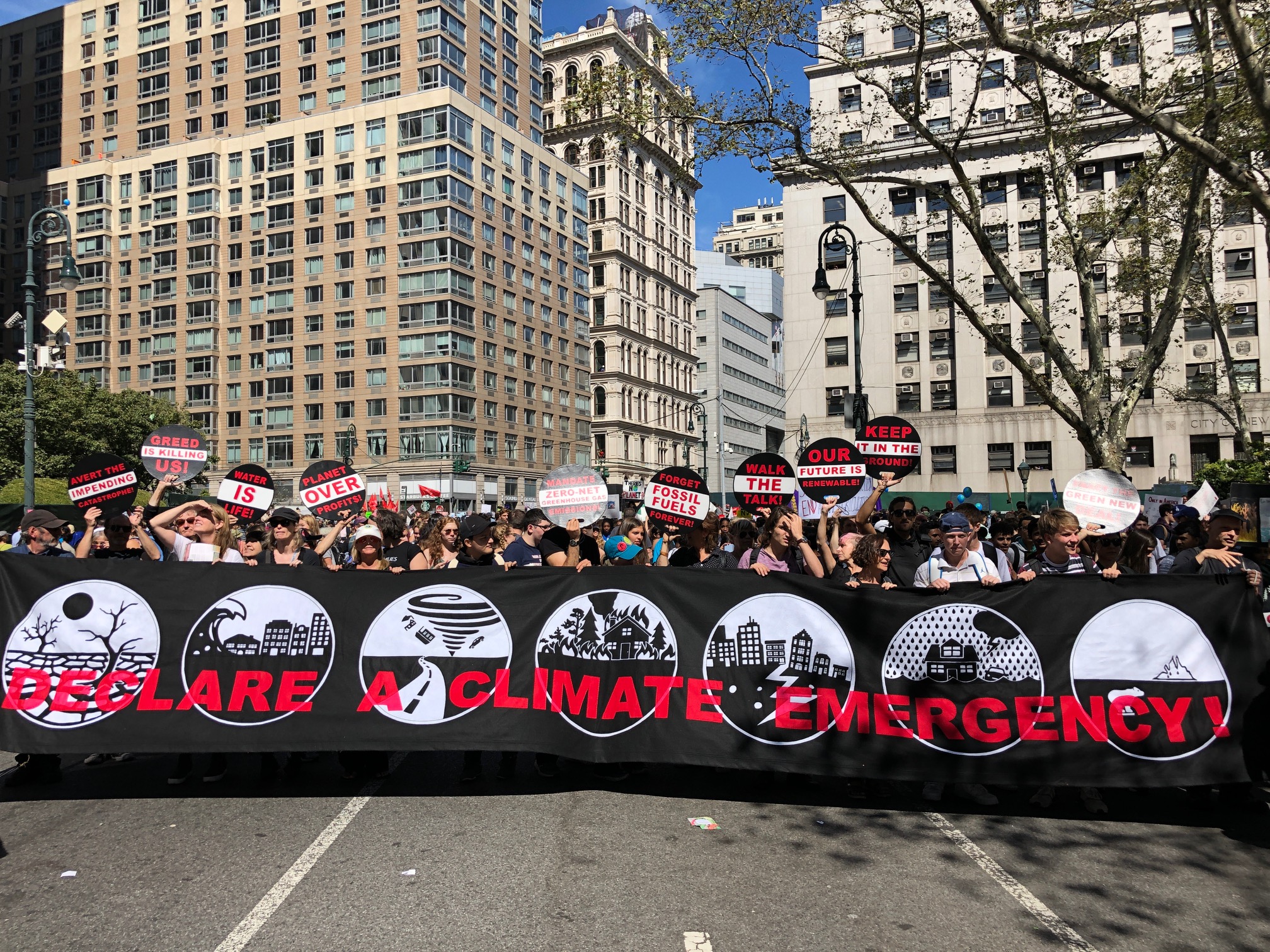The bigger the protests, the better for investors.
In a counter-intuitive shift, the estimated four million global youth climate strikers who took to the streets last week may be more pro-business than recalcitrant heads of state gathering at the United Nations intent on slow-walking climate action. The U.S., Brazil and Japan, for example, have not even asked to speak at today’s Climate Action Summit, where 60 or so countries are expected to present more ambitious carbon-reduction plans.
By catalyzing a powerful political constituency for urgent climate action, protesters may accelerate the low-carbon transition and soften climate shock. By most expert analysis, keeping global temperature rise within 1.5- or even 2- degrees Celsius produces better returns for almost all investors.
By forestalling action, climate skeptics make a harder landing more likely, threatening economic growth and prosperity and, not incidentally, tanking investment portfolios.
The mispriced risks, and sometimes misguided analysis, of climate change is the subject of ImpactAlpha’s latest Returns on Investment podcast. The conversation around climate change has undeniably heated up (especially during Climate Week), “but we’re not seeing this reduction in investment in fossil fuels,” says roundtable regular Imogen Rose-Smith, now a contributing editor at ImpactAlpha. “The markets are not set up to think about risks they haven’t experienced before.”
The key question for investors is whether the risks of climate change already are “priced in” to asset values. The notion of “stranded assets” has gone from fringe assertion to conventional wisdom in less than six years, and expanded from simply unburnable fossil fuels to coal-fired power plants, other industrial facilities and pipelines and even coastal real estate. The bursting of the “carbon bubble” could wipe out from $1 trillion to $4 trillion in fossil fuel assets alone, according to a study last year.
The efficient-market hypothesis holds that asset prices already fully reflect all available information and therefore that such future risks, discounted to the present, already are priced in. Banks’ loan terms and insurance policy underwriting should likewise reflect the real risks. They do not, Rose-Smith says.
“We’re continuing to build the fossil fuel infrastructure even as we recognize that over the next decade we have to transition to a renewable economy,” she says. “We’re still financing the building of pipelines, which makes no sense.” Since the Paris climate agreement in 2015, bank lending to the fossil fuel industry has increased every year. JPMorgan Chase alone has committed $196 billion in fossil-fuel financing according to “Banking on Climate Change” from the Rainforest Action Network. (In 2017, JPMorgan also committed to facilitate $200 billion in clean-energy financing by 2025).
“What would happen if, tomorrow, Chase announced that it was going to phase out lending to the fossil-fuel industry—probably first by restricting loans for particular projects, and then by ending general corporate lending and banning the underwriting of new debt and equity for fossil-fuel companies?” author and activist Bill McKibben asks in The New Yorker.
What might happen is at least a smoother transition for the bank itself, investors in general and the planet as a whole. (McKibben, who earlier spearheaded the movement to pressure investors to divest from fossil fuels, is launching a campaign to press banks, asset managers and insurers to make such changes).
BlackRock earlier this year warned that climate risk is mispriced in municipal bonds and commercial real estate, among other assets. In another report, Mercer said the market’s mispricing of physical risks (floods, hurricanes, rising seas, crop failures and more) causes the mispricing of transition risks, including regulatory and other mandates that strand or devalue assets.
The longer policymakers, companies and investors delay, the more rapid the transition to a zero-carbon economy and the more disruptive the changes will be. “In reality, sudden changes in return impacts are more likely than neat, annual averages,” Mercer advises.
Risk, adjusted: BlackRock and Mercer signal the repricing of climate risk
The reason markets don’t fully price climate risk include “the tragedy of the horizons,” namely that a shorter-term investor may still be able to get out of fossil-fuel investment in time to reap attractive returns. Policy uncertainty also changes the investment equation; in the short-term, stalled global action actually reduces transition risk by forestalling regulatory mandates. And of course, the low (or nonexistent) pricing of carbon means that the full cost of emissions remain largely an “externality” to valuations and investment decision-making.
That is changing, of course. This summer’s acquisition of the climate-analytics firm Four Twenty Seven by the ratings agency Moody’s signals a shift in the market’s pricing of climate risks. The European Union is on the verge of issuing regulations requiring corporations, banks and insurance companies to report in detail their climate risks and other sustainability metrics. The U.K., Sweden, France have committed to carbon-neutrality by 2050.
“Does that machinery grind fast enough for the change to happen for the worst effects to be avoided?” I asked in the podcast. The roundtable’s consensus: Not nearly. That’s why a major political and popular mobilization is needed – for investors as well as everybody else.
The Mercer report advised that advocating for and creating investment conditions that support the “well-below 2⁰C scenario” “is most likely to provide the economic and investment environment necessary to pay pensions, endowment grants and insurance claims over the timeframes required by beneficiaries.”
“Thank god for the school kids and the young people who are marching this week, and thank God for voters next year, who might have a say in this,” I said (in getting in the last word. “It’s got to be a change in direction.”
Catch up on all of ImpactAlpha’s Returns on Investment podcasts on iTunes, Spotify, SoundCloud or Stitcher.











